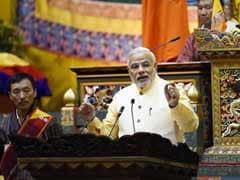
Prime Minister Narendra Modi, who is in Bhutan on his first foreign visit since taking office, today said "A strong and stable India is needed to ensure we can help our neighbours." In a joint statement issued during Modi's first foreign visit since he took office in May, Bhutan and India agreed not to allow each other's territory to be used "for interests inimical to the other", without giving further details.
Here is your 10-point cheat-sheet to the story:
A strong and prosperous India is in the interest of nations in the "SAARC" grouping, or the South Asian Association for Regional Cooperation, Mr Modi said, addressing a joint session of the Bhutan Parliament this morning. "If India progresses, it will directly impact the development of neighbours," he said. (Watch: Modi to Bhutan Parliament)
The PM arrived in Bhutan on Sunday for a two-day visit, stepping up a charm offensive with neighbours to try to check China's influence in the region.
"I said a while back B for B (Bharat for Bhutan and Bhutan for Bharat), I said it just like that but later I realised that it must be a sign from God that I said this," Mr Modi said at a banquet hosted by Bhutanese Prime Minister Tshering Tobgay yesterday. (Good Neighbour Important for Happiness, Modi tells Bhutan)
The PM said relations with Bhutan "will be a key foreign policy priority of my government", adding that Bhutan was a "natural choice" for his first visit.
Analysts say the decision to make Bhutan his first port of call is designed to underline the importance that Mr Modi places on neighbourly relations, which suffered under the last government.
"Bhutan may be a small country but it is strategically very important and... China is on the other side," said Ranjit Gupta, a retired ambassador whose postings included Nepal and India's UN mission.
Critics say the previous Congress party government began to take relationships for granted, allowing economic giant China - which shares a border with four of India's neighbours - to step into the breach.
Talks are expected to focus on strengthening ties over the kingdom's hydropower plants, which supply much-needed clean energy to India. Bilateral trade was worth $1.1 billion in 2012.
India, a power-deficit nation with severe outages, has helped Bhutan develop three hydropower plants with another three under construction. There was friction with Bhutan when India cut fuel subsidies before elections last year, although they were restored after Tshering Tobgay was elected Prime Minister.(Modi a Friendly and Knowledgable Person: Bhutan PM)
In April the two countries signed a framework agreement on four more joint venture power projects totaling 2,120 megawatts, and the PM will lay the foundation stone for a new project during the visit.

